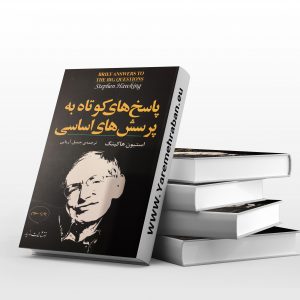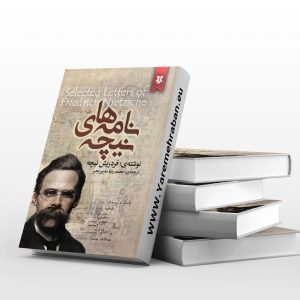Description
The Phenomenology of spirit, or the phenomenology of the soul, or the phenomenology of the soul, or the phenomenology of the mind, is one of Hegel’s most important philosophical works. The value of this book lies in the fact that, first of all, it can be called the first Hegelian book by Hegel, in which he completely freed himself from the ideas of his predecessors, especially Kant and Schelling, and presented himself as a philosopher of style.
Second, the Phenomenology of spirit possesses such a profound philosophical system that even if Hegel did not write any other book, it alone had the potential to make Hegel a great philosopher. So far, three Persian translations of the book Phenomenology of the Soul have been published in Iran:
However, this is not a bad thing at all.
Hegel, George Wilhelm Faridrish, Phenomenology of Life, translated by Baqir Parham, Tehran: Exploration, 2014.
Hegel, George Wilhelm Faridrishe, The Phenomenology of the Soul, translated by Ibrahim Maleksmaili, Tehran: Negah, 2016.
Also, several translations of different summaries or sections, such as prefaces or different chapters, have been done in Persian.
Hegel, George Wilhelm Faridrich, Introduction to the Phenomenology of Life, translated by Baqir Parham, Tehran: Agah, 2008.
Vala, Jeanne Andrew, The Dissatisfaction of Consciousness in Hegel’s Philosophy, with the chapter Lord and Servant, translated by Baqer Parham, Tehran: Agah, 2008.
Hegel, George Wilhelm Faridrich, The Phenomenology of Hegel’s Soul, Introduction by Chman Findley, Alexander Kozhu, ج Translated by Bahman Modizir, Tehran: Updated, 2014.
Hegel, George Wilhelm Faridrish, Phenomenology of the Soul, translated by Bahram Abbasi, Tehran: Tablet of Thought, 2016.
However, George Willie Friedrich, Goddess and Benedict, interprets the characters in Kojo; Sweden: Iran Book Center, 1985 = 1364.
Hugh, George Wilhelm Faridrisha, Introduction to the Period of the Identity of the Soul, translated by Mahmoud Abadiyan, Urma: 13, Publications.
Hegel, Georg Wilhelm Faridrich, Hegel’s Introductions to the Phenomenology of the Soul and Aesthetics, translated by Mahmoud Ebadian, Tehran: Alam Publishing, 2008.
Works about this book have been written or translated into Persian.
Ardabili, Mohammad Mehdi, Awareness and self-awareness in the phenomenology of Hegel’s soul, Tehran: Roozbehan, 2011.
Ardabili, Mohammad Mehdi, Hegel: From metaphysics to phenomenology (description of Jena metaphysics and its relationship with the phenomenology of Hegel’s soul), Tehran: Scientific publication, 2015.
Mojtahidi, Karim, Phenomenology of the Spirit in terms of Hegel’s view: According to the book “The Genesis and Structure of the Phenomenology of Hegel”, the effect of Jean-hypolite, adaptation and compilation of Karim Mojtahidi, Tehran: Scientific and cultural publications, 1992.
The World, Theory, Hegelian Communications: An Instruction on the Manifestation of Hegelian Mental Science, Tehran: Nashr-e No, 2003.
Shahinfar, Fatemeh, Self-awareness in Hegel’s thought, Isfahan: Darkhovin Publishing, 2014.
Fiqh, Mohammad Mohammadi, An Introduction to the Expansion of the Absolute Soul in Hegel’s Phenomenology, Tehran: Cultural Institute of Human Studies, 2016.
Inwood, Michael, Georg Wilhelm Friedrich Hegel: The Phenomenology of the Soul, translated by Mohammad Hadi Hajibiglou, Tehran: Daily Life, 2016.
Stern, Robert, Hegel and the Phenomenology of the Soul, translated by Mohammad Mehdi Ardabili and Seyed Mohammad Javad Seyed, Tehran: Phoenix, 2014.
Also in 2010, Javad Tabatabai held a 16-session lecture on the phenomenology of the soul.
The phenomenology of Hegel’s soul is undoubtedly one of the greatest philosophical works in history in terms of style and philosophical content. This book is one of the most important works written about Hegel, the study of which is essential for understanding Hegelian philosophy and system, and because of its extensive content and its immense effects on later thought. It can be considered a turning point in modern thought.
The present book tells the story of the journey of the soul (history) from its most primitive and lowest home, ie certainty-sensory, to the highest level of consciousness, ie absolute knowledge. . Hegel and The Phenomenology of the Soul provides a preliminary and, as far as possible, complete and coherent description of the whole phenomenology of the soul and tries to explain the whole process of soul formation in an understandable language with a commitment to the text of phenomenology and its dialectical continuum. And interpret a considerable aristocracy over all of Hegel’s commentators.
“Mohammad Mehdi Ardabili” is the translator of this book Phenomenology of spirit, a teacher of philosophy, and his specialty is working in the philosophy of German idealism, especially Hegel’s ideas. The note on the back of the book: “Hegel and the Phenomenology of the Soul, by Robert Stern, provides an introductory and, as far as possible, complete and coherent description of the whole phenomenology of the soul.” This book, despite its limited volume, attempts to interpret the whole process of soul formation in an understandable language with a commitment to the text of phenomenology and its dialectical continuum, as well as numerous references to other works by Hegel and considerable aristocracy to all Hegel commentators.
Friedrich Bizrain considers the book “the best introductory guide to the phenomenology of the soul in English,” and Stephen Holgit considers it an introduction that is “admirably clear and useful for one of the most complex books in the history of philosophy.” “So Stern’s interpretation has a lot to say, and the audience can use it to shed light on the labyrinth of phenomenology.” Although Hegel allows sensory certainty to answer the initial problems before it reaches a final conclusion, he eventually realizes that the “now” and the “here” fail to acquire the unique individualized nature that this certainty seeks;
Because “now” and “here” can include many objects. Since the “person” is the only thing present in my experience as a subject, the first reaction of sensory certainty is to make the “here” and the “now” a unique feature of this person. But in response to this reaction, Hegel shows sensory certainty that other objects are also present in the experience of other subjects;
As a result, there is nothing that can single out the object in relation to the subject: “I, this’s, see the tree and say ‘here’ as a tree, but another’s also sees a house and claims that ‘here’ There is not a tree, but a house instead. Both of these facts have the same validity, in other words, they both have [similarity] in the immediacy of their observation and the certainty and certainty of their knowledge; “But one truth is not in the heart of another and it is destroyed … ٰ I, like ‘now’, ‘here’ or ‘this’ in general, is just a general thing.”
Looking at the works of Martin Heidegger, it is easy to see that he talks to Hegel from time to time. But in particular, we have three important books about Hegel from Heidegger: 1. The concept of experience in Hegel; Hegel And the Greeks; 3. The Phenomenology of Hegel’s Soul. Among these, the first and third books have been translated into English. Before dealing with the contents of the book, it is necessary to address some of the characteristics of the book and its translators.
First, this book is not a book like Existence and Time, but a speech lesson Heidegger gave in the winter semester (1931-1932) at the University of Freiburg, and later from student manuscripts and drafts. Heidegger’s own works have been collected. Second, Parviz Emad is a Distinguished Professor of Philosophy at Deauville University and the author of Heidegger and the Phenomenology of Values and Kenneth Mali, Professor of Philosophy at the University of Wisconsin. Nab Kant “and” Contributing to Philosophy “by Heidegger. He is also one of the founders and co-editors of” Heidegger Studies “.
Third, it is a very important point that the translators make in the foreword to the book, and that is to describe how Heidegger dealt with the text of the phenomenology of the soul. The text that can be interpreted based on Hegel’s life is not encountered, but in his view the text is the “act of thinking” that only by participating in this act, the text can be encountered as a living thing. The basis of this life is Hegel, which must be studied in the light of his work).
Therefore, with this book, it is not possible to deal with it as a description of a sentence, a text, or a general interpretation of it, but Heidegger seeks to exfoliate the emergence of the soul step by step in this act of thinking and to emerge. As we deal with it throughout the book. The phenomenology of the soul equates to the appearance of the soul, so in (*) Martin Heidegger also intends to return Hegel’s question to the original question of metaphysics, namely The question of its existence and movement reveals the beginning of these gradual and precise stages of the emergence of the soul one by one.
After a short income, it is worth taking a brief look at the book’s chapters. The book has two main sections: 1. Awareness; 2. Self-awareness. The book has three chapters: 1- Sensory certainty; 2- Perception; 3. Power and comprehension. Therefore, the book consists of four main parts. Examines the dual role of the phenomenology of the soul in the whole of Hegel’s intellectual system. Recommends Hegel’s text. Examining the concepts of absolute, relative, knowledge, field of knowledge, experience and phenomenology in Hegel is another point to read.
In the consciousness section, by emphasizing the object-oriented or object-oriented nature of consciousness, it shows that this knowledge does not go beyond relativity in all its stages. This slavery is enough for consciousness that always seeks in another. Consciousness at every stage of itself considers something to be true. In the sensory certainty of this truth, Masharalieh is “this” (partial thing), but “this” is always referred to, so “intention” and the indication that it is a mental thing. And it is general, it also has a role in this truth, and as an antithesis, “this” resolves it in order to seek its truth in a higher stage of consciousness in its perception and object, that is, the “object” and its unity. .
Here, too, consciousness, with regard to the object, realizes that the object becomes aware of the infinite multiplicity of attributes formed by “deception” in perception, and by eliminating unity and multiplicity at a higher stage with understanding and truth. It is here that the “force” is confronted. This is where Heidegger takes the rise of the concept of force from “relation” and the independence of relation in relation to its parties, but the determination of relation to its parties, takes a new step in philosophy. By analyzing the concept of force, Hegel steps out of the sensory world and dares to know Kant’s always unknown realm, that is, the meta-sensory world. Introduces the phenomenon that appears in perception. But we do not leave consciousness with force because comprehension still seeks the truth in the object and not in itself.
This cognition, though general, is still conditional on the object, while true cognition occurs when cognition is absolute, that is, it has become self-conscious, when the subject sees the object as expanding and embracing it. Another important point of the book is the study of important concepts of Heidegger’s philosophy according to Hegel. These concepts are: temporality, ontological distinction, dialectic, existence and time.
1- Introducing the book Phenomenology of spirit on YouTube
2- Introducing the book Phenomenology of spirit in Aparat














Reviews
There are no reviews yet.